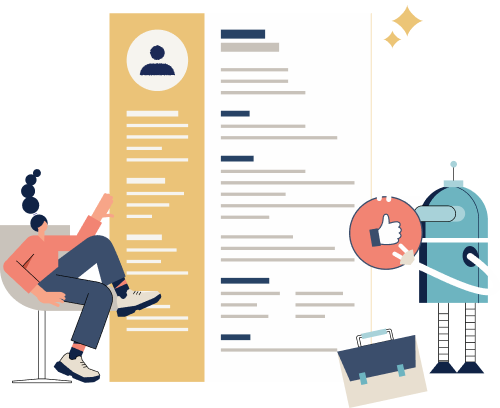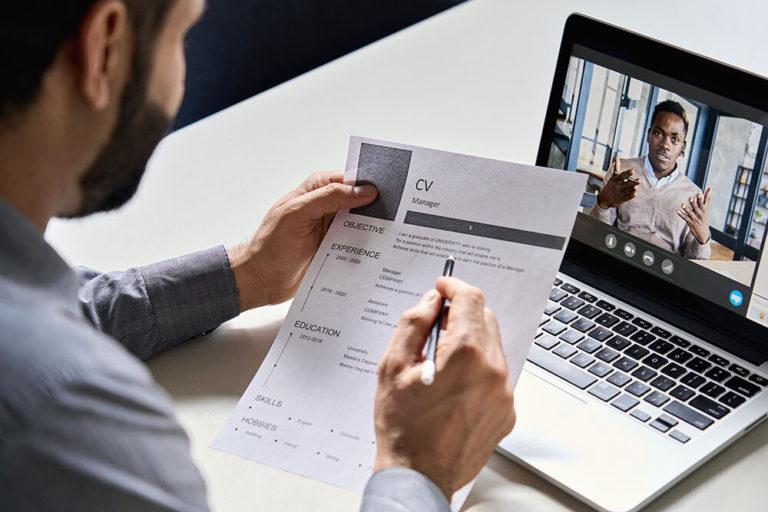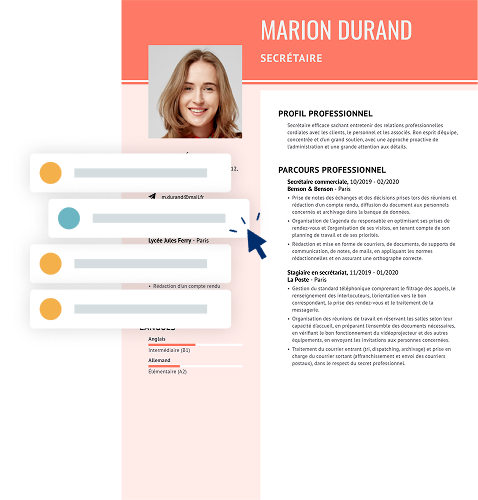15 Phone Interview Questions and Answers (Best Tips)
Phone interviews are often the first step in the hiring process, used to screen candidates before face-to-face meetings. Here are 15 of the most common phone interview questions you’re likely to be asked, with sample answers and tips to help you prepare.


Our customers have been hired by: *Foot Note
What is a screening interview?
Phone interviews are often the first step in the hiring process. Employers use them to screen candidates quickly, check if you meet the basic criteria, and assess your interest in the role. But just because you’re not face-to-face doesn’t mean you can take it lightly. A strong phone interview can make the difference between moving forward or getting dropped.
Unlike in-person interviews, phone interviews lack visual cues, so your tone of voice, clarity, and preparation matter even more. In this guide, we’ll walk you through the most common phone interview questions, with sample answers to help you feel confident and ready for your next call.
15 common telephone interview questions and answers
Here are some of the most common phone interview questions you’re likely to encounter during a telephone screening. If you’re preparing for a face-to-face or video interview, check out our 25 common interview questions to get fully prepared.

Tell me about yourself.
This is often the opening question in any interview, and your chance to make a strong first impression. Don’t just repeat what’s on your CV; try to offer a concise, engaging summary of your professional background, key skills, and career goals that align with the job. Think of it as a quick elevator pitch to capture the interviewer’s interest.
Sample answer:
“I’m a marketing professional with over five years’ experience managing digital campaigns and content strategy, especially in the tech sector. At my previous role, I led a project that resulted in a 30% increase in website traffic. I’m passionate about data-driven marketing and looking for a role where I can use my skills to drive growth, which is why the position caught my attention.”
Why are you interested in this role?
Employers ask this question to assess your motivation and whether you’ve done your research. They want to know if you understand the role’s responsibilities and how it fits with your career path. Your answer should demonstrate genuine enthusiasm and show that your skills and ambitions align with what the company needs, signalling you’re likely to be committed and engaged if hired.
Sample answer:
“I’m interested in this role because it offers the chance to develop my project management skills in a company known for innovation. I admire John Lewis’s focus on customer experience and feel my background in coordinating events fits well with your team’s goals.”
What do you know about our company?
This question tests your preparation and interest in the organisation. Interviewers want to hear that you’ve researched their business, values, and recent developments. A good answer shows you’re proactive and motivated to work there, rather than just applying randomly. It also indicates cultural fit, which is important for long-term success.
Sample answer:
“Sephora is a leading UK department store known for excellent customer service and quality products. I’ve read about your recent sustainability initiatives, which I find inspiring, and I’d love to contribute to such forward-thinking projects.”
Can you describe your strengths?
This question helps interviewers evaluate if your qualities match the job requirements. They’re looking for relevant skills and personal attributes that will make you effective in the role. By providing specific strengths with examples, you show self-awareness and credibility. Avoid vague answers and focus on strengths that will benefit the employer, such as communication skills.
Sample answer:
“My strengths include strong communication, attention to detail, and the ability to work well under pressure. For example, at my last job, I managed multiple customer requests simultaneously while maintaining high satisfaction levels.”
Why are you looking for a new job?
Interviewers ask this to understand your motivation for leaving your current or previous role. They want to see if your reasons are positive and professional, and whether your goals align with what their company can offer. Be honest, but focus on how this opportunity fits your career path rather than talking about the negatives of your previous job.
Sample answer:
“I’m looking for new challenges and opportunities to develop my skills. My current role has been great for building my foundation, but I’m keen to work in a more dynamic environment like [Company Name] where I can contribute more directly to projects and grow professionally.”
Can you tell me about your last role and what you did?
This question helps the interviewer verify your experience and understand how relevant your previous responsibilities are to the new job. They want a clear, concise summary showing you have practical skills and work experience that match the role.
Sample answer:
“In my last role, I managed customer enquiries and processed orders. I also helped improve the team’s response time by implementing a new tracking system, which reduced delays by 20%.”
How soon can you start?
Employers ask this to gauge your availability and to plan their hiring timeline. A prompt start can be a bonus, but if you have notice periods or commitments, be clear and professional about your timeline.
Sample answer:
“I’m available to start after giving my current employer one month’s notice, but I’m happy to discuss if an earlier start is needed.”
How do you feel about remote work?
With many roles offering flexible working, this question checks if you’re comfortable working remotely. Employers want to know that you can stay productive and communicate well outside the office environment. If you have previous experience working remotely, be sure to mention it.
Sample answer:
“I’m comfortable with remote work and have experience using digital tools like Microsoft Teams and Zoom to collaborate with colleagues. I find I can stay organised and focused working from home.”
Are you comfortable working in a team?
Teamwork is an essential interpersonal skill required in many roles, and this question assesses your ability to collaborate and communicate with others. Employers seek candidates who can make positive contributions and support team goals.
Sample answer:
“Yes, I enjoy working in teams. In my previous role, I regularly collaborated with colleagues from different departments to solve customer issues and improve processes.”
Have you worked in a hybrid schedule before?
This question explores your experience and adaptability to a mixed working model, which combines office and remote work. Employers want to ensure you can handle the flexibility and stay productive in both settings.
Sample answer:
“Yes, I worked a hybrid schedule at my last job, spending three days in the office and two days remote. I adapted well by maintaining clear communication and managing my workload efficiently.”
Where do you see yourself in three years?
Interviewers ask this to understand your career ambitions and to see if the role aligns with your long-term goals. A thoughtful answer shows you’re motivated and looking to grow within the company.
Sample answer:
“In three years, I hope to have developed my skills in project management and taken on more responsibility in leading teams. I see this role as a great stepping stone towards that.”
Do you prefer working independently or as part of a team?
Employers want to see if your work style fits their company culture and the role’s requirements. It’s essential to answer honestly, but also tailor your response to meet the job’s requirements. For example, if the position involves remote work, highlight your experience and comfort working independently in that setting. If the role requires close teamwork, emphasise your ability to collaborate effectively.
Sample answer:
“I enjoy both working independently and as part of a team. I’m confident managing my own tasks, especially when working remotely, as I have experience using online collaboration tools to stay connected. At the same time, I value teamwork and regularly contribute to group projects to achieve shared goals.”
Have you worked with any specific software or tools related to this role?
This is a straightforward way for employers to confirm your technical skills and readiness to hit the ground running. If the interviewer mentions a tool you’re not yet familiar with, it’s a good idea to show your willingness to learn by mentioning any related courses or self-study you’re doing in your spare time.
Sample answer:
“Yes, I have experience with Microsoft Excel, Salesforce, and Trello, which I’ve used for data analysis, customer relationship management, and project tracking. I noticed your team also uses Asana, which I’m currently learning through an online course to ensure I can quickly contribute to the workflow.”
Are you willing to travel for this job?
Employers ask this to confirm if travel requirements suit your circumstances. Be honest about your availability.
Sample answer:
“I’m comfortable with occasional travel and have experience managing my schedule to accommodate trips without affecting my productivity.”
Do you have any questions for me?
This is your opportunity to express interest and gather valuable information. Employers ask this to see if you’ve thought about the role and company, and to gauge your enthusiasm. Prepare a couple of relevant questions in advance.
Sample questions to ask:
- “Could you tell me more about the team I’d be working with?”
- “What does a typical day look like for someone in this role?”
- “What opportunities are there for training and professional development?
- “Can you tell me more about the company benefits?”
- “What do you enjoy most about working for this company?”
- “How does the company support work-life balance?”
- “What are the next steps in the interview process after this call?”
Phone interview tips

A telephone interview is often the first step in the screening process, so it’s important to prepare thoroughly and treat it as seriously as an in-person interview. Here are some effective telephone interview tips to help you make a strong impression during your screening call:
- Find a quiet space: Choose a calm, distraction-free environment for your telephone interview. Background noise can disrupt your conversation and make it hard for the interviewer to hear you clearly.
- Have your CV and notes handy: Keep a copy of your CV, the job description, and any notes about the company close by. This allows you to quickly reference key points or facts during the call.
- Practice your answers: Rehearse common phone interview questions and answers aloud to build confidence. Practising will also help you sound clear and concise.
- Speak clearly and with enthusiasm: Without visual cues, your tone of voice becomes your primary tool for showing enthusiasm and professionalism. Smile as you talk, it can naturally brighten your voice.
- Listen carefully: Pay close attention to the interviewer’s questions and comments. If you didn’t hear something, politely ask them to repeat or clarify. Try to fully understand the question before answering. It’s okay to pause briefly to gather your thoughts.
- Keep your answers focused: Phone screening questions tend to be brief and direct. Avoid rambling—answer clearly and stay relevant to the role.
- Be ready to take notes. Writing down important details will make it easier to have follow-up questions at the end of the call.
- Prepare your questions: Have a few insightful questions ready to ask at the end of the call. This demonstrates your interest and helps you gather important information.
How to prepare for a screening interview
A screening interview, often conducted by phone, is an initial step used by employers to narrow down the pool of candidates before inviting them for face-to-face interviews. Its main purpose is to quickly assess if you meet the basic requirements for the role and to understand your motivation and availability.

Preparing well for a screening interview can make a big difference in how confident you come across. Here are some key steps to help you get ready:
- Review your CV thoroughly. Interviewers often base their questions on the information you’ve provided, so be ready to discuss your experience, skills, and achievements in detail. Ensure that you can clearly articulate any key points on your CV.
- Research the company and role. Understand the company’s products, values, and industry position. Knowing the job description inside out will help you tailor your answers to what the employer is looking for.
- Prepare answers to common screening questions. Practising these responses can help you sound clear and confident.
- Have your documents handy. Keep a copy of your CV, job description, and any notes nearby to quickly reference during the interview.
Key Takeaways
- Phone interviews are often the first step in the recruitment process, serving as a screening tool to assess your fit for the role and company.
- Preparing thoroughly by reviewing common phone interview questions and your CV will help you answer confidently and clearly.
- Treat the phone interview with the same professionalism as an in-person meeting—find a quiet space, speak clearly, and show enthusiasm.
- Use the opportunity to ask thoughtful questions that demonstrate your interest and help you learn more about the role.
- If you’re struggling to land phone interviews, consider updating your CV with our CV builder. A well-structured, tailored CV has been shown to significantly increase interview chances.

Andrew Smith
Senior Content Writer
Meet Andrew Smith – an accomplished English copywriter with a strong background in SEO optimisation. Passionate about producing engaging content, Andrew has written across various fields, including health and fitness, security, travel, and tourism.
*The names and logos of the companies referred to above are all trademarks of their respective holders. Unless specifically stated otherwise, such references are not intended to imply any affiliation or association with myperfectCV.










